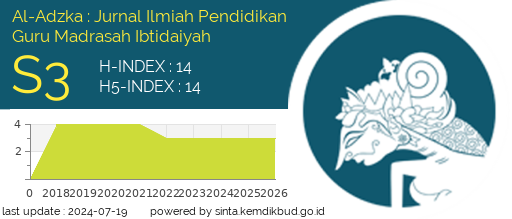Penggunaan Pendekatan Kontekstual untuk Meningkatkan Hasil Belajar Bahasa Indonesia Materi Pelajaran Menulis Puisi di Madrasah Ibtidaiyah Negeri Selat Hulu Kapuas
DOI:
https://doi.org/10.18592/aladzkapgmi.v4i2.2228Abstract
In teaching writing, contextual learning means learning to unleash the full potential of a student naturally. Students are given the opportunity to apply and develop ideas critically and communicative in the form of written language which can be meaningful for themselves and for those who read it. This thesis aims are: 1) To know the differences in the learning result of Indonesian subject in poetry writing material among the students who learn with contextual approach and the students who learn with conventional approach, and 2) To know the effectiveness of using contextual approach in improving the learning result of Indonesian subject on poetry writing material. This research used a quasi-experimental design. The subject was the fifth grade students of MIN Selat Hulu Kapuas academic year 2012/2013. Class Va as experimental group and class Vb as control group. The taught material is writing poetry. The first data of students’ ability is taken from pretest result, while the posttest result is used as research data. The results showed that there are significant differences between the students’ learning results of Indonesian subject in experimental group with control group. If seen from the average value of the posttest, the results of learning in the experimental group (75.87) is higher than the average value of the control group (68.13). This difference was also confirmed by the results of the calculations of Independent-sample T-Test which significance value is smaller than the sig. = 0.05 which is equal to 0.002. This showed that the use of the contextual approach can improve students’ learning result. Meanwhile, the effectiveness test calculations showed that the average value of g factor in the experimental group showed 0.49 points. This means, the use of a contextual approach in Indonesian subjects is quite effective in improving student learning result in the subject matter writing poetry.References
Erliningsih, Ise Dwi. (2009) Meningkatkan Kemampuan Menulis dan Mengapresiasi Puisi..Skripsi, tidak diterbitkan. Malang: Universitas Negeri Malang.
Hidayah, Dwi Roh. (2011) Penerapan CTL untuk Meningkatkan Kemampuan Menulis Puisi pada Siswa Kelas V SDN I Kedungrejo Nguntoronadi Wonogiri Tahun Pelajaran 2010/2011. Skripsi. Surakarta: Universitas Sebelas Maret. http://dglib.uns.ac.id/.
Jabrohim, Chairul Anwar, dan Suminto A. Sayuti. (2009) Cara Menulis Kreatif. Yogyakarta: Pustaka Pelajar.
Johnson, Elaine B. (2002) Contextual Teaching and Learning: What It is and Why It’s Here to Stay. Diterjemahkan oleh Ibnu Setiawan. 2007. Bandung: MLC.
Nurhadi. (2002) Pembelajaran Kontekstual dan Penerapannya dalam KBK. Malang: Universitas Negeri Malang Press.
Nurhadi, dkk (2004) Pembelajaran Kontekstual dan Penerapannya Malang: Universitas Negeri Malang Press.
Nursanti, Galuh Indra. (2009) Peningkatan Kemampuan Menulis Puisi Melalui Media Gambar Ilustrasi di Kelas III SDN Gandul 01 Madiun. Skripsi, tidak diterbitkan. Malang: Universitas Negeri Malang.
Roekhan. (199) Menulis Kreatif. Dasar-dasar dan Petunjuk Penerapannya. Malang: YA3.
Stewig, John Warren. (1980) Children and Literature. Chicago: Rand McNally Colledge Publishing Company.
Tompkins, Gail E. (1994) Teaching Writing: Balancing Process and Product. New York: Macmillan Colledge Publishing Company.
Wibowo, Hermawan Tri Santiyo. (2010) Peningkatan Kemampuan Menulis Puisi dengan Media Lagu pada Siswa Kelas V SD Negeri Tambakboyo I Mantingan Skripsis, tidak diterbitkan. Surakarta: Univesitas Muhammadiyah Surakarta.
Zulela. (2012) Pembelajaran Bahasa
Indonesia Apresiasi Sastra di Sekolah Dasar. Bandung: PT. Remaja Rosdakarya
Published
How to Cite
Issue
Section
License
Copyright (c) 2018 Khairunnisa Khairunnisa

This work is licensed under a Creative Commons Attribution 4.0 International License.
Authors who publish with this journal agree to the following terms:
- Authors retain copyright and grant the journal right of first publication with the work simultaneously licensed under a Creative Commons Attribution 4.0 International that allows others to share the work with an acknowledgement of the work's authorship and initial publication in this journal.
- Authors are able to enter into separate, additional contractual arrangements for the non-exclusive distribution of the journal's published version of the work (e.g., post it to an institutional repository or publish it in a book), with an acknowledgement of its initial publication in this journal.
- Authors are permitted and encouraged to post their work online (e.g., in institutional repositories or on their website) prior to and during the submission process, as it can lead to productive exchanges, as well as earlier and greater citation of published work.








